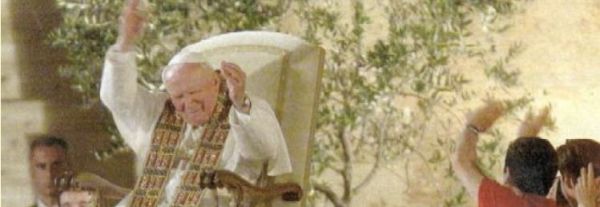Since the beginning of my pontificate, I have considered the dialogue of the Church with the cultures of our time to be a vital field, in which the destiny of the world is at stake at this end of the 20th century. In fact, there is a fundamental dimension, capable of consolidating or shaking to the foundations the systems that structure the whole of humanity, and of freeing human existence, both individual and collective, from the threats that weigh upon it. This fundamental dimension is man, in his entirety. Now man lives a fully human life thanks to culture. 'Yes, man's future depends on culture', I declared in my speech on 2 June 1980 at UNESCO, addressing interlocutors so diverse in their origin and convictions, adding: 'We find ourselves on the ground of culture, a fundamental reality that unites us... We find ourselves around man and in a certain sense, in man'.
Picking up the rich inheritance of the Ecumenical Council, of the Synod of Bishops and of my venerable predecessor Paul VI, on 1 and 2 June 1980 I proclaimed in Paris, first at the Catholic Institute, and then before the exceptional assembly of UNESCO, the organic and constitutive bond that exists between Christianity and culture, with man, therefore, in his very humanity. This bond of the Gospel with man, I said in my speech before that areopagus of men and women of culture and science from all over the world, 'is, in effect, the creator of culture in its very foundation'. And, if culture is what makes man, as man, become more man, then man's very destiny is at stake in it. Hence the importance for the Church, which is responsible for it, of attentive and far-sighted pastoral action with regard to culture, in particular what is called living culture, that is, the set of principles and values that make up the ethos of a people: "The synthesis between culture and faith is not only a requirement of culture, but also of faith... A faith that does not become culture is a faith that is not fully accepted, not entirely thought out, not faithfully lived" ("Discorso ai partecipanti al Congresso Nazionale del Movimento ecclesiale di impegno culturale": "Insegnamenti", V, 1 [1982] 131), as I said on 16 January 1982.
On the other hand, there is an urgent need for our contemporaries, and Catholics in particular, to seriously question the conditions that underlie the development of peoples. It is increasingly evident that cultural progress is intimately linked to the construction of a fairer and more fraternal world. As I said in Hiroshima, on 25 February 1981, to the representatives of science and culture gathered at the United Nations University: 'The construction of a more just humanity or of a more united international community is not a dream or a vain ideal. It is a moral imperative, a sacred duty, which man's intellectual and spiritual genius can meet by a new mobilisation of everyone's talents and energies and by harnessing all man's technical and cultural resources" ("Teachings", IV 1 [1981] 545).
Consequently, by virtue of my apostolic mission, I feel the responsibility incumbent upon me, in the heart of the collegiality of the universal Church, and in contact and agreement with the local Churches, to intensify the Holy See's relations with all the achievements of culture, ensuring also an original relationship in a fruitful international collaboration, within the family of nations, that is, of the great "communities of men united by different bonds, but above all, essentially by culture" ("Address to UNESCO", 2 June 1980: "Teachings" III [1980] 1636ff).
For this reason, I decided to found and establish a Council for Culture, capable of giving the whole Church a common impulse in the encounter, continually renewed, of the saving message of the Gospel with the plurality of cultures, in the diversity of peoples, to whom it must bring its fruits of grace.
[Pope John Paul II, Letter instituting the Pontifical Council for Culture, 20 May 1982]












